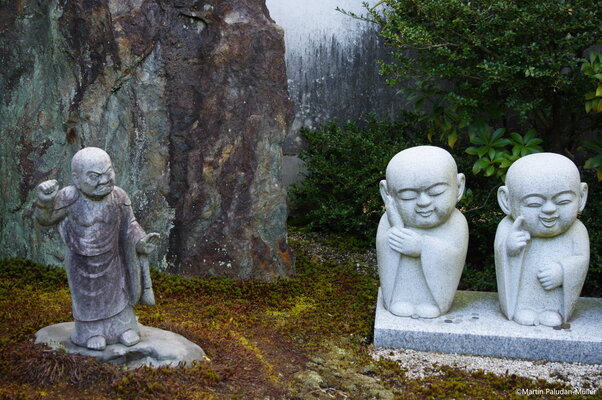The fearless, learned individual of the Renaissance opened the world. The descendant thrives as a piously provocative worshipper of ‘own opinions’, devoid of a minimum of knowledge. “Die Partei hat immer Recht” belongs to the dark history of Europe. “Here I stand, I can do nothing else” shines through the humanism of the Renaissance. European lines frame what I see as a human being in the world.
Russia is like Europe – only minus the Renaissance, some have said. An ethnocentric but understandable attempt to see the Russians. But now I skip them – and go to Japan, where I have lived much longer. Admittedly, I have heard that the more years one spends in the archipelago, the less one has to report. Is there oblivion in the air?

© Martin Paludan-Müller
“The customer is God,” says a Japanese proverb. The traveler enjoys it – and the warm and helpful people along the way. But can you, as a resident European, accommodate and live with the culture of mass society? There is no point in heading east with: Japan is like Europe – minus what, Europe? One would then eye a black hole, despite the perfect aesthetics and technique. Let me rather tell you about my own attempt.
My insecurity was palpable on the way to my first Danish class in Osaka; it was with 2nd year students. But soon I felt that the cordial students would help me get started. The difficult beginning was to decipher how much Danish they understood at each grade level. For a newly arrived language teacher, it is certainly more difficult in Japan than anywhere else.
First, personal restraint is rooted in Japanese behavior. The facial expressions are minimalist, so I invented a rule that a Japanese smile of 1 millimeter corresponds to a Danish one of 1 centimeter; the Japanese thus requires sharper vision to read. To ease the atmosphere, on the other hand, one draws one’s mouth wide while speaking; this unfortunately distorts the pronunciation of other languages’ round vowels.
Second, the teacher is still met with awe – even without any personal merit. There may be a cool formality and distance in the Confucian relationship, which stands in the way of cozy, confidential conversation that, in my experience, best develops the language, on waves of empathy and motivation. After all, superficial respect forces the learner to give only the perfect answer – or none. This is not how you learn a foreign language.
Here I must mention the perfect Japanese ‘contract’ between college and students: The students should never worry about evaluating their teachers, but can get their exam for a fee and courtesy without having done much academically. Therefore, it can probably surprise when the relationship with a foreign teacher does not quite play like that. That you do not automatically get points for being physically present and behaving politely is possibly new. Then it is the teacher’s duty to explain that professional judgment has nothing to do with the personal relationship. I have experienced failing students, whom I would very much like to spare – and have, conversely, reluctantly let others pass.
The challenge is little by little to dissolve empty and timid respect in favor of trust and professional esteem that grows when one acknowledges each other’s sincere attempts to do their best. A Dane should not naively believe that one can immediately appear demonstratively informal and relaxed anywhere in the world. But learning a new language is also getting used to a culture, and daring to give oneself away as a teacher, even to clown a little, helps the students by contrast to understand what is important. And they will be less afraid to try by themselves and to show who they are. Then there is a possibility that good conversation arises, preferably with a playful touch. This leads on to folk high schools and friendships in Denmark – and has made Denmark many friends.

© Martin Paludan-Müller
A fundamental difference from Europe in terms of professionalism is that a European university would never allow its own sports clubs to dominate a lot of students’ time and lives. When a student tells me that she spends 20 hours a week at her club and only a few hours studying, one has to ask what the major subject is – and the meaning.
In some clubs, strict rankings prevail between younger students and the older ones, who force them away from their studies. No one is stopping them from doing so – as long as everyone just shows the teachers ‘respect’ and does not disturb. Being able to survive in a sports club, flexible and with empty eyes, counts among employers who often already have employees from the network. No other subjects are in demand.
A club can be a relentless hierarchy whose main subject is obedient cooperation. A few years ago, a coach at an American football club ordered one of his skilled players to incapacitate an opponent by hammering his helmeted head into his back. It worked!
One student was safety officer in an aikido club whose members, even in the humid hot summer, are strictly forbidden from consuming fluids, and during several hours of training at that. She could not possibly get this rule overturned, even though it had resulted in ambulance visits. According to managed agreement, it cannot be helped – on the other hand, the responsibility was formally hers, i.e., nobody’s. The only task is to safeguard the invisible hierarchy against criticism. She was feeling bad.
A critical, i.e., selfish individual unfortunately has not learned to test the atmosphere: ‘To read the air’, it is called. Words like ‘no’ and ‘why’ are rarely used outside the home. Cautious vagueness is considered polite, superior wisdom. The social yes-man is in touch with the herd, but has no recollection when the wind has changed, or the war is lost. In the air it reads: It was not me – because the self was absent.
To read the air politely is to deposit oneself in totality, harmonious or totalitarian. Without any trace of contrapuntal doubt, there is no connecting thread of conscience backwards. If you are required to take a stand, if you are held accountable, you will flatly refer to the entire organization, i.e., nobody. We are always right, even when the opposite is true tomorrow.
For my son, rooted in two cultures, I have always wanted him to learn from the Europeans to speak frankly, but with humility, and from the Japanese, to learn to read the others, though not as a chameleon.
In an air where power is God, no god has power, but the gods slave away as extras. There is no independent command from the decorative religions – let alone from foreign ideas, concepts and names that one likes to adorn oneself with.

© Martin Paludan-Müller
At a large university’s faculty for international studies, you must, as an invited associate professor, experience receiving your contract in Japanese only, and that you are never invited to discuss the department’s work. They bow to each other, but not to those with foreign thoughts. Foreigners do not understand how to read the air of cooperation: Nobody wants an academic discussion, only to use their knowledge in their sheltered workshop. The law of the islands seems familiar: “Do not believe you can teach us anything”. However, it is important to show off the department’s alien when new students are to be recruited – but not what the exotic creature might have to say.
At the sandbox, in the world of mothers, we are fortunately in the same world; the stranger is a human in the park. Beard and blue eyes, the only father – yet we do not set boundaries: “Have you stopped breastfeeding?”
Television avoids dangerous topics and exhibits cuteness as well as food that is brought into mouths, followed by clever or delighted outbursts. Young people try on punctured pants and colored hair in the years before their job interviews. In the novel ‘Convenience Store Woman’, the perfect store employee is nothing but her choreographed functions – in a mysterious absence of mystery.
If power resembles a black hole, art must adorn – like a haiku’s airy characters in the void.
© Martin Paludan-Müller. English translation from Danish: https://pov.international/at-laese-luften-i-japan/

Martin Paludan-Müller
I was born in Copenhagen and graduated from Copenhagen University:
- MA, Danish language and literature
- BA, applied linguistics
- BA, philosophy
I have worked as a Danish lecturer in Poznan, Osaka, Prague and Saint Petersburg. Among my Danish publications I will mention:
- Snemand (poems, Jorinde & Joringel, 1987).
- Stilleleg (haiku/photo, Mellemgaard, 2009)
- Syn – essays and pictures from times and places (Ellekær, 2020).

![To read the air in Japan [Essay]](https://itsyourjapan.com/wp-content/uploads/2022/12/japan-festival.jpg)


